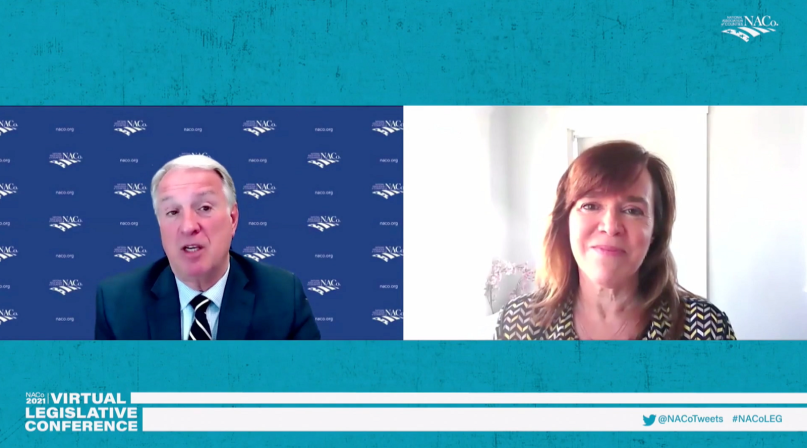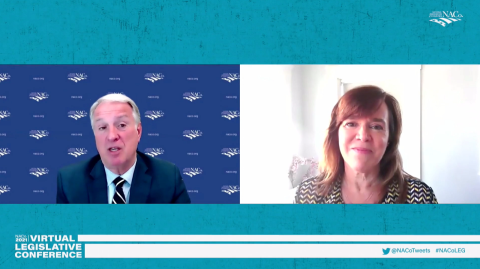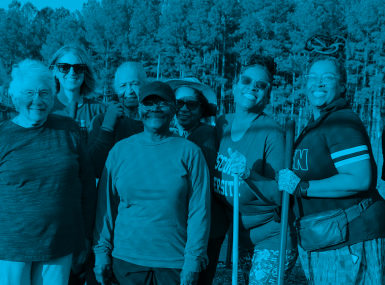Q&A: iCivics’ Louise Dubé highlights need for civic education
Author
Upcoming Events
Related News

Key Takeaways
When Boone County, Ky. Judge/Executive Gary Moore began his NACo presidency last summer, he announced that his presidential priority of the LEAD Initiative would focus on the core themes of leadership, education, action and development.
With counties playing a role in encouraging civic education and engagement in schools and communities, NACo has been partnering with iCivics, an organization founded by retired Supreme Court Justice Sandra Day O’Connor. iCivics provides civic education resources for educators and county officials.
“I believe county leaders can play a critical role in embracing civility and enriching the public’s understanding of county government,” Moore said.
Moore discussed the importance of civic engagement in communities with iCivics Executive Director Louise Dubé during NACo’s 2021 Virtual Legislative Conference.
Learn More
Moore: Could you please explain iCivics and your mission?
Dubé: We at iCivics create nonpartisan, free materials to ensure that we can reach excellence in civic education. Our goal is really to build civic strength and just prepare students for their role in our civic life. We’ve done that over the course of the last decade by creating materials that are available digitally from our site icivics.org. We are known for 20 games. We put students right in the middle of the action where they are experiencing what it’s like to be a civic leader. Additionally, we have hundreds of lesson plans that are available to teachers.
Moore: How can civic education lead to greater participation in our democratic institutions and engagement in public service?
Dubé: That is such an important question. The idea in our experiment in self-government in America, which is the oldest such experiment in the world, is really to solve problems. In order to solve problems from the smallest local problems to the larger national problems, you need to be able to work across differences. As many of my colleagues say, disagreement in a constitutional democracy is not a bug, it’s a feature. You will have to resolve problems with people you disagree with. Those skills are the skills that civic education can impart.
Moore: What do you think are the greatest challenges to embracing civic education and how can we overcome some of these conflicts?
Dubé: The real issue is the level of intense polarization in our country now means that we don’t agree on what to teach. When we don’t agree on what to teach, then we don’t teach it. When we don’t teach it, we don’t practice it. It’s kind of a vicious circle that we see in summation and that’s really unfortunate. I really believe that there’s an enormous amount of common ground between people if we can teach folks the skills and disposition to actually find that common ground because that is the basis of our system.
Moore: Tell me more about iCivics’ Educating for American Democracy Project. What is the purpose of the project and how do you envision working with counties to advance its goal?
Dubé: About 300 scholars and educators got together and said, all right, we have this problem that our country is polarized, our constitutional democracy is really challenged right now and yet we can’t agree on what to teach. What we need is to come up with this new guidance to try to find those points of ‘What does it take to have students become proficient at knowledge and at skills and disposition for this new world?’ From that, our goals are really to have 60 million students have the opportunity for high quality civic learning and then 100,000 schools be civic ready. That is all work that gets done at the local level, in some cases with the help of states, but really it has to be a priority for the local leaders. Educating for American Democracy is a roadmap for the future — how to teach American history and civics integrated together for depth, for preparation, for local leaders to take up and implement in their school districts even directly with educators. This is a very simple document that asks a set of questions and those questions are hard. That is the kind of thinking we want students to do which is in-depth, look at the history, look at the perspectives that it’s taking and then become ready to help us lead our counties in the future.

Attachments
Related News

Announcing 2025 NACo Achievement Award Winners
NACo is pleased to announce the winners for the 2025 Achievement Awards. Through a non-competitive application process, noteworthy programs receive awards in 18 categories that cover a vast range of county responsibilities.

America’s Counties Recognize April 2025 as National County Government Month
America’s Counties this month are joining the National Association of Counties (NACo) in recognizing National County Government Month (NCGM). Throughout April, counties will honor the county workforce, educate residents about local programs and services and celebrate the county role in the intergovernmental partnership.

Celebrate 2025 National County Government Month
Join us in celebrating National County Government Month (NCGM) 2025! Since 1991, NACo has encouraged counties to utilize NCGM to actively promote county roles and responsibilities in serving residents.
